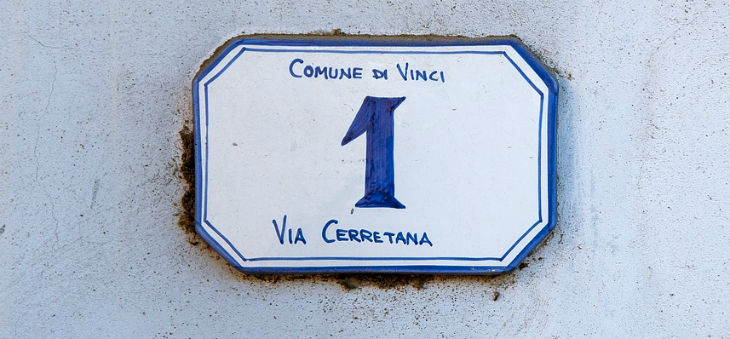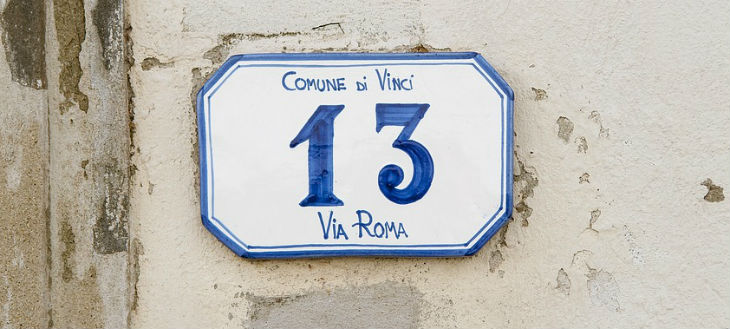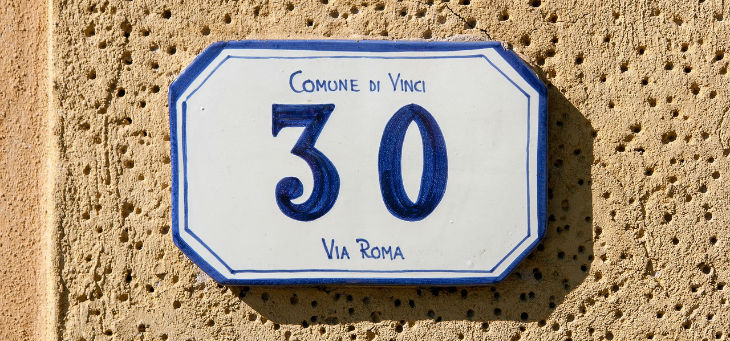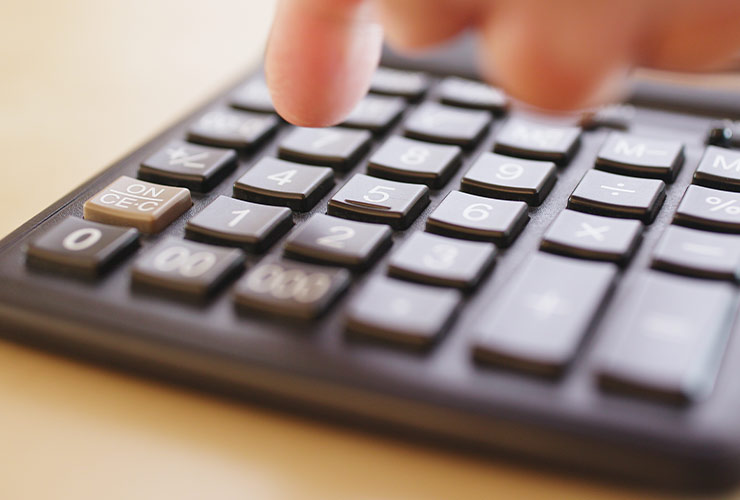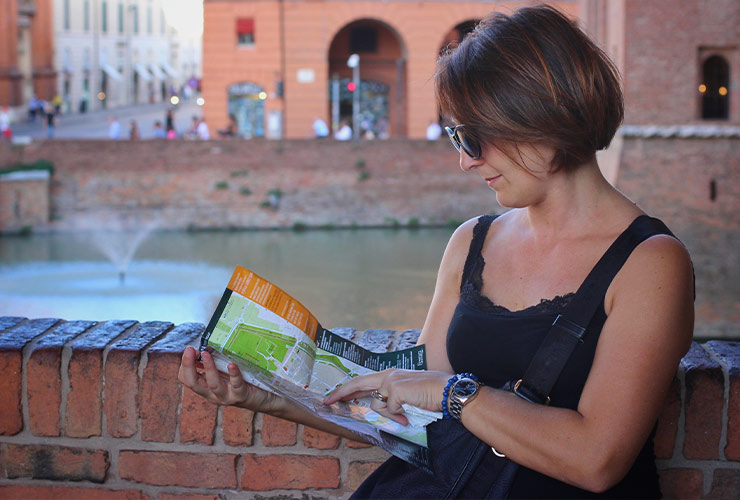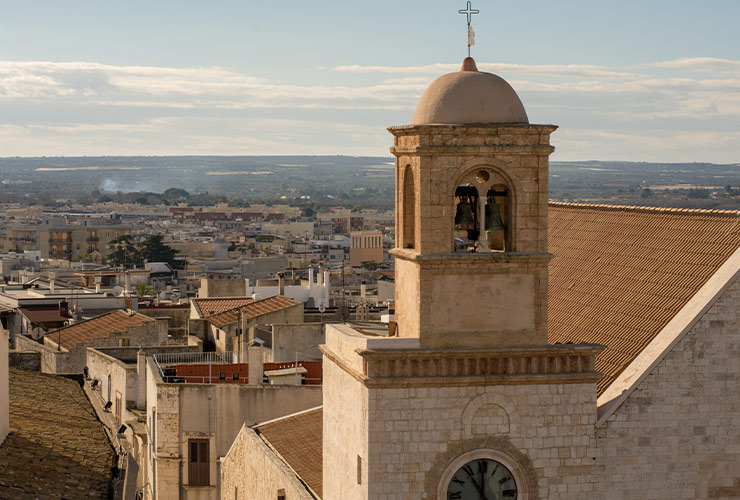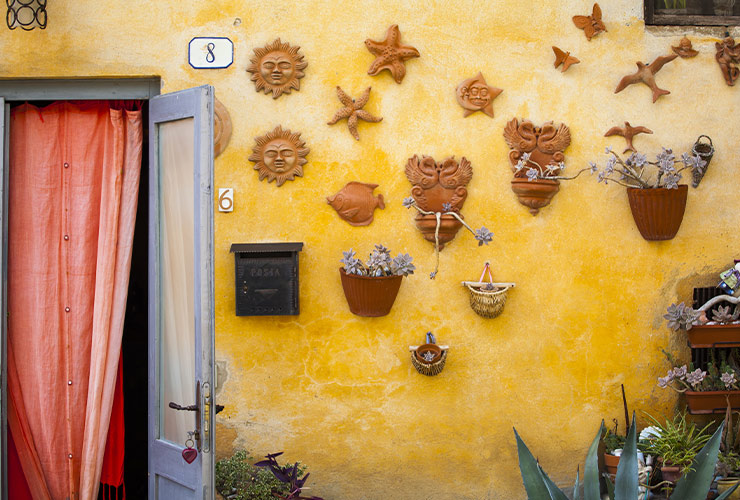Each one of us enjoys different things, but we can all agree on one thing: We all enjoy well-prepared food! As Virginia Woolf said in one of her books: “One cannot think well, love well, sleep well, if one has not dined well.”
Many of us take meals for granted, we rush to eat our breakfast to get at work on time, we rush to have our lunch in order to be able to fulfill today’s duties, sometimes we even can’t wait to finish our dinner so that we can lay in our bed after a long, tiring day. That’s not Italians, though!
Italians don’t eat only because they feel the need to, they eat because food is something you should dedicate yourself to, something you should enjoy.
Did you know that typical traditional meals in Italy contain four or five courses? During lunchtime and dinnertime, but also especially during weekends, meals in Italy can last for hours, much longer than in other cultures.
Could you guess why? It’s simple. Meals are often seen not for sustenance, but as a time to spend with family and friends, to enjoy each other’s company and forget for some time every day’s burdens and duties.
To spread the love for Italian food and culture, here you will learn the best Italian phrases for food. But before we get to the basic Italian food-related expressions, let’s take a quick look at all the course meals Italians have.
Italian Full-Course Meals
| Aperitivo | Apéritif, mostly enjoyed as an appetizer before a large meal.Usually, Italians consume Campari, Martini, Prosecco, Aperol Spritz, Negroni… |
| Antipasto | Literally it means “before meal”. It can be hot or cold and usually consists of formaggio (cheese), prosciutto (ham), verdure (vegetables) or pesce (fish). |
| Primo | “First course”, usually consists of a hot dish like pasta, risotto, gnocchi with sauces made from meat, vegetables or seafood. |
| Secondo | “Second course” is the main dish usually pesce (fish) or carne con patate (meat with potatoes). Meat is most commonly found in the North, while fish is more popular in the South. |
| Contorno | “Side dish”. It may be a salad or cooked vegetables. |
| Formaggio e frutta | “Cheese and fruits” |
| Dolce | “Sweet”, “dessert”, such as cakes, cookies, ice-cream. |
| Caffè | Coffee |
| Digestivo | “Digestives”, liquors (grappa, limoncello, Sambuca) |
These full-course meals are mainly used for special events such as weddings, holidays, and big family reunions. Everyday meals mostly include first and/or second course, a side dish and a coffee.
Now that you know the food order in Italian meals, you are ready to learn some of the basic Italian phrases for food that will definitely come in handy wherever you go.
1. Italian Eating Phrases
In a restaurant, at pizzeria, at a friends’ house, it doesn’t matter!
There is no better way to feel the Italian culture than to start eating like Italian and start speaking like Italian.
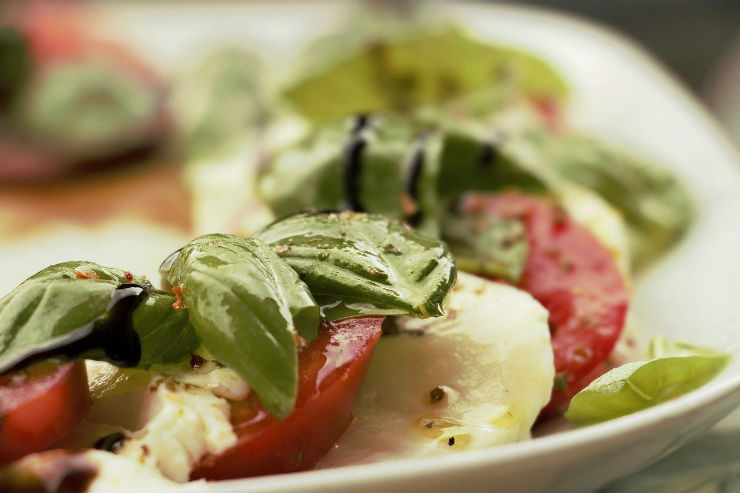
Here are some useful phrases which you will definitely use while having a meal:
| Buon appetito! | Enjoy your meal! |
| Potrei vedere il menù? | May I see the menu? |
| Mangiamo! | Let’s eat! |
| Posso assaggiare? | Can I have a taste? |
| È delizioso! | It’s delicious! |
| Passa il sale, per favore. | Pass the salt, please. |
| È ora di colazione/pranzo/cena! | It’s breakfast time/lunchtime/dinnertime! |
| Salute! / Cin cin! | Cheers! |
| Cosa mi consiglia? | What would you recommend? |
| Il conto, per favore. | The check, please. |
2. Italian Phrases To Use At A Restaurant
It’s very likely that you will end up in an Italian restaurant!
Of course, first you would like to say a word or two with il cameriere (the waiter) or la cameriera (the waitress). Being able to communicate with those serving you is the first step for opening up in Italian.
There are several ways to be polite in Italian when deciding to eat in a restaurant:
| Buongiorno, avete un tavolo per due? | Good afternoon, do you have a table for two? |
| Il menù, per favore. | The menu, please. |
| Scusi, vogliamo ordinare. | Excuse me, we would like to order. |
| Cosa mi raccomanda? | What do you recommend? |
| Io prendo… | I will have…(when you are ready to order) |
| Possiamo avere il conto?Il conto, per favore.Possiamo pagare? | Could we have the bill?The bill, please.Can we pay? |
| Potrei avere un tovagliolo, per favore? | Can I have a napkin, please? |
| Grazie, è stato delizioso. | Thank you, it was delicious. |
| Arrivederci. | Goodbye. |
| Per favore. | Please. |
3. Italian Phrases To Use At A Pizzeria
Isn’t the best place to try pizza in an Italian pizzeria?
Italians are experts in making pizza, after all they are the inventors of pizza. Most places sell wood-fired pizzas, but there are also many places that sell by slice.
You can either order pizza al taglio, a slice of pizza as a snack to go, or pizza tonda, whole round pizza.
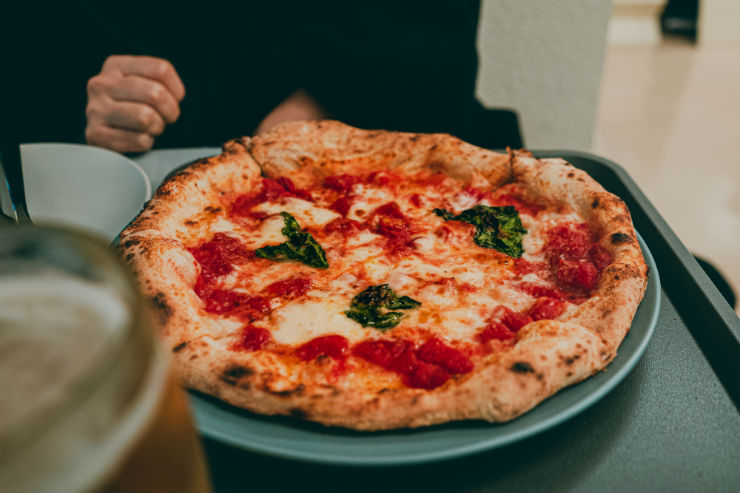
Here’s an example on how to order your favorite pizza in Italy:
| Venditore: Buongiorno. | Seller: Hello. |
| Antonio: Buongiorno, vorrei un pezzo di Margherita, per favore. | Antonio: Hi, I would like a slice of Margherita, please. |
| Venditore: Va bene. Te la riscaldo? | Seller: Okay, would you like it warmed up? |
| Antonio: Sì, la mangio adesso. | Yes, I’ll eat it right now. |
| Venditore: 2 euro, per favore. | That will be 2 euros, please. |
| Antonio: Prego. | Here you go. |
| Venditore: Ecco la tua pizza, buon appetito! | Here’s your pizza, enjoy. |
| Antonio: Grazie mille, buona giornata! | Thank you, have a good day! |
| Venditore: (Buona giornata) anche a te! | Good day to you too! |
While you can order a slice of pizza on the streets, going to a pizzeria means you can choose food from a menu. Here’s some useful vocabulary to use at the pizzeria:
| Siamo in due. Vorremmo un tavolo. | We would like a table for two. |
| Possiamo ordinare? | Can we order? |
| Vorrei una margherita. | I would like pizza margherita. |
| Io prendo una quattro formaggi. | I will have one Quattro Formaggi pizza. |
| Posso ordinare da mangiare? | Can I order something to eat? |
| Com’è il calzone? | What’s the calzone like? |
| Ci può portare il conto? | Can we have the bill? |
| Sono indeciso tra la pizza margherita e la pizza vegetariana. | I can’t decide between pizza Margherita and vegetarian pizza. |
4. Italian Phrases To Use At A Café
We all know there’s a complex coffee culture in Italy. Drinking coffee is not just a routine, it’s something that makes Italians’ day.
There are two words in Italian for going to “café”. Italians use “il bar” and “il caffè” to refer to the place they can get both coffee and alcoholic beverages at.
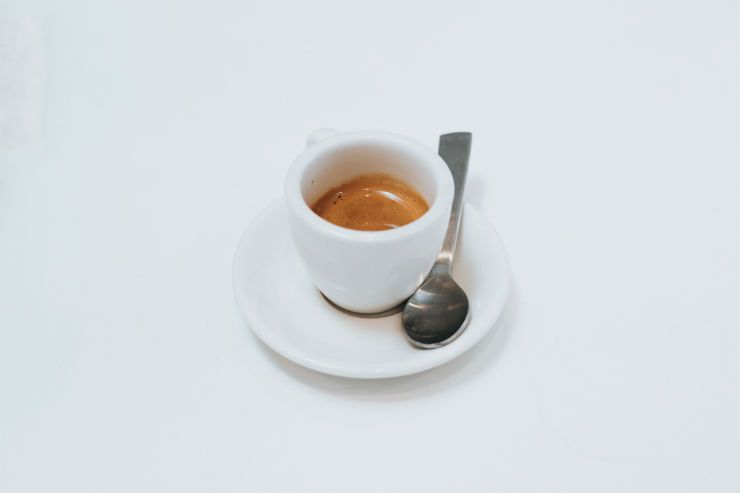
Once you enter the bar, the barista (barman) will ask you:
| Buongiorno, dimmi! | Good afternoon, what would you like? |
| Cosa volete ordinare da bere? | What would you like to order as a drink? |
| Un caffè? | Coffee? |
| Volete anche un cornetto? | Would you also like a croissant? |
Here’s some phrases on how to order coffee and snacks in Italian like a local:
| Andiamo al bar/al caffè! | Let’s go to the bar! |
| Prendiamo un caffè? | Would you like to have a cup of coffee? |
| Vuoi andare al bar? | Do you want to go to the bar? |
| Vuoi un caffè? | Do you want coffee? |
| Vorrei un espresso, per favore. | I would like an espresso, please.(This is the “default” coffee in Italy. If you want espresso, you can simply say, ”Un caffè, per favore.” |
| Vorrei un doppio espresso. | I would like two shots of espresso. |
| Per me un cappuccino. | For me cappuccino.(Shot of espresso with a bit of milk and milk foam) |
| Prendo un caffè lungo. | I will take caffè lungo.(Italian way to order a doppio espresso) |
| Prendo un caffè corto. | I will take caffè corto.(Just a few drops of pure, concentrated caffeine) |
| Vorrei un caffè corretto. | I would like caffè corretto.(literally “correct coffee”, with a shot of liquor, usually grappa). |
| Potrei avere lo zucchero? | Could I have sugar? |
| Potrei avere un cucchiaino? | Could I have a small spoon? |
| Un bicchiere d’acqua liscia/frizzante, per favore. | A glass of water without/with carbonation, please. |
| Mi piacerebbe un panino. | I would like a sandwich.(usually with cheese and prosciutto). |
| Prendo un cornetto alla crema. | I will have a brioche with cream. |
| Vorrei un tramezzino. | I would like tramezzino.(a thin sandwich on soft white bread) |
Italians drink coffee at the banco (counter). That’s because they come to the bar for a quick drink. If you drink coffee at the table, you will automatically have caffè coperto (covered coffee), which means they will charge you for the service!
NOTE: If you want to be a local in Italy, you drink cappuccino only until 11 am. Espresso is best to drink after lunch.
5. Italian Phrases To Use At A Pastry Shop
If you are like me your favorite place is the pastry shop, in Italian la pasticceria. It’s where the magic happens, where you can enjoy the best cakes and desserts in the world!
The most popular Italian dessert is tiramisù (coffee-flavored dessert). Then there is pasticciotto (typical Italian cake with custard cream filling) and panna cotta. And if you didn’t know where to get the world’s best ice-cream, just try Italian gelato!
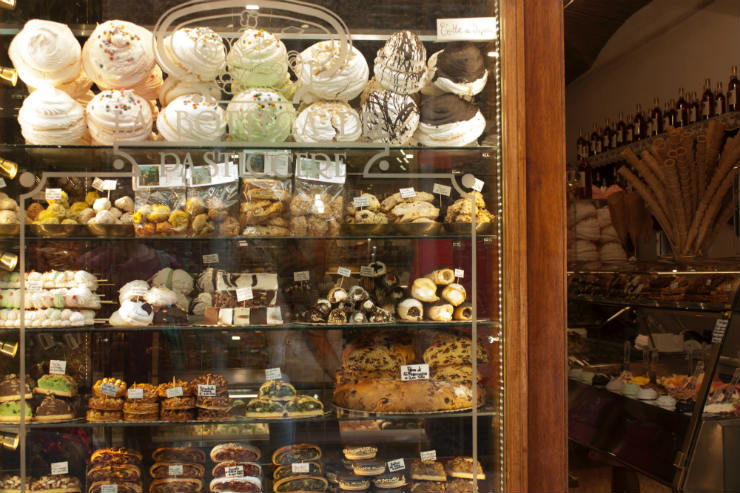
Once you enter into pasticceria italiana you will know what you want to taste. You will also know how to order it. Just use some of the following Italian phrases for food:
| Che dolci avete? | What desserts do you have? |
| Vorrei un tiramisù е un bicchiere d’acqua. | I’d like tiramisu and a glass of water. |
| Vorrei una panna cotta, per favore. | I would like panna cotta, please. |
| Quale dolce mi consiglia? | Which dessert would you suggest to me? |
| Vorrei assaggiare la torta al limone. Ma anche la torta alle mele. | I’d like to taste the lemon cake. But also the apple cake. |
| Che gusti di gelato avete? | What ice-cream flavors do you have? |
| Ci sono tanti gusti di gelato. Al cioccolato, al pistacchio, al limone, al caffè. | There are so many ice-cream flavors. Chocolate, pistachio, lemon, coffee. |
| Preferisco un gelato alla nocciola. | I prefer hazelnut flavor. |
6. Italian Phrases To Use At A Grocery Store
If you stop at a grocery store, you can learn a lot of Italian vocabulary just by looking at the products. In every negozio (shop), mercato (market), supermercato (supermarket), there are commesse (sales clerks) that will help you with your choice.
Here is your opportunity to use your basic Italian phrases for food to ask for whatever you need.
| FRASI CHE PROBABILMENTE SENTIRAI | PHRASES YOU WILL PROBABLY HEAR |
| Buongiorno, cosa sta cercando? | Good afternoon, what are you looking for? |
| La posso aiutare, signore/a? | Can I help you sir/madam? |
| Vuole pagare in contanti o con la carta di credito? | Would you like to pay in cash or credit card? |
| Vuole qualcos’altro? | Anything else? |
| Questo costa 200 euro. | It costs 200 euros. |
| FRASI UTILI | USEFUL PHRASES |
| Salve, quanto costano le mele? | Hello, how much are the apples? |
| Prendo due chili di patate. | I’ll take two kilos of potatoes. |
| Vorrei pagare con la carta di credito. | I’d like to pay with a credit card. |
| Potrei avere una busta, per favore? | Could I have a plastic bag, please? |
| Quanto devo pagare? | How much do I have to pay? |
| Grazie mille, buona giornata! | Thank you, have a nice day! |
| Dove sono gli spaghetti? | Where can I find the spaghetti? |
7. Italian Phrases To Use At A Butcher Shop
Going to a macelleria, or butcher shop is a regular part of everyday life in Italy. The meat is less expensive, better quality and is definitely fresher than at the grocery store. You can buy sliced products or sized according to your preferences.
If you’ve ever want to go into a macelleria in Italy, here are some phrases for ordering what you need:
| Vorrei……….le ali. le cosce. il petto di pollo. il fegato. il vitello. il tacchino. la bistecca. l’agnello. | I would like………wings. thighs. chicken breast. liver. veal. turkey. beefsteak. lamb. |
| Buongiorno, vorrei due etti di petti di pollo. | Good morning, I would like 200 grams of chicken breast. |
| Come si può cucinare? | How can it be cooked? |
| Basta, grazie. | That’s enough, thank you. |
8. Italian Phrases To Use At A Fish Market
Fish Markets are very common in Italy. La pescheria is the best place to buy fresh fish and seafood you are looking for. The seller will clean the fish for you and will probably leave the head on.
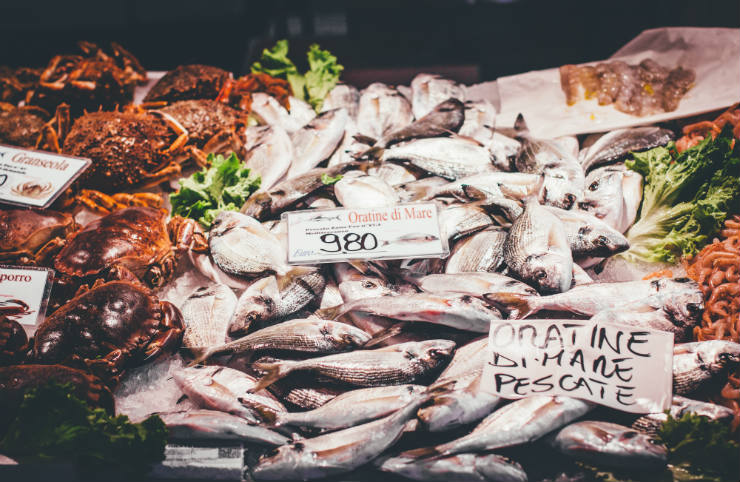
Here are some Italian phrases that would be useful to you at a fish market:
| Buongiorno, è fresco il pesce? | Good morning, is the fish fresh? |
| Dammi 1 chilo di aragosta, per favore. | Give me 1kg of lobster, please. |
| Vorrei mezzo chilo di calamari. | I’d like a half kilogram of squid. |
| Quanto costa il gambero? | How much does the shrimp cost? |
| Non so cosa prendere tra polpo e salmone. Cosa è meglio? | I can’t decide between octopus and salmon. What’s better? |
| È buona la seppia? | Is the sepia good? |
| Potrei avere 1 chilo di vongole? | Could I have 1 kilogram of clams? |
| Un pezzo di tonno, per favore. | One piece of tuna fish, please. |
9. Italian Phrases To Use At A Wine Shop
An enoteca is the special type of local or regional wine shop you go to when you want to taste the best wine, made in Italy.

Here are some Italian phrases you can use when visiting an enoteca, that will help you not only order wine, but also give your opinion about it:
| Mi piacerebbe assaggiare un vino bianco di questa regione. | I’d like to taste white wine from this region. |
| Io prendo un bicchiere di vino rosso. | I’d have one glass of red wine. |
| Il rosato ha un sapore amaro. | The Rosé has a bitter flavor. |
| Da dove proviene? | Where does it come from? |
| Non mi piace. È molto morbido. | I don’t like it. It’s very smooth. |
| Mmmm…è buono. | Mmmmm…it’s good. |
| Preferisco i vini più secchi. | I prefer drier wines. |
| Ha un sapore fruttato. | It has a fruity flavor. |
10. Italian Cooking and Baking Phrases
There are plenty of ways to prepare food. For example, octopus has a different flavor if you eat it fresh, cooked, roasted or fried. The same is true with other fish, meat, and vegetables.
The secret of delicious food lies in the ingredients, but also in the way one’s prepared it.

Here are some Italian expressions that indicate what kind of food you are eating.
| A me piace la pasta al dente. | I like pasta al dente.(“al dente” means cooked so as to be still firm when eaten. Usually refers to slightly undercooked pasta.) |
| I calamari fritti sono i migliori. | The fried squid is the best. |
| Preferisco un pesce affumicato. | I prefer smoked fish. |
| La mamma prepara la carne di maiale al forno. | My mom cooks baked pork.(“al forno” refers to a dish cooked in the oven.) |
| Pollo fritto oppure verdure fritte? | Fried chicken or fried vegetables? |
| Io prenderei un pesce alla griglia. | I’ll take grilled fish.(“alla griglia” means “grilled” or “barbecued”.) |
| A me piace la pasta fresca. | I would like pasta fresca.(freshly made pasta) |
| A me piace la pasta secca. | I would like pasta secca.(dry pasta) |
Last, but not least, just to show you how much food is present in the Italian language, let’s take a look at some Italian expressions and sayings that enrich the language:
| IDIOM | LITERAL MEANING | REAL MEANING |
| Fare una spaghettata | To eat spaghetti | Let’s meet up and for a casual dinner! |
| Sono pieno come un uovo | I’m full as an egg | It means you are full and just simply cannot eat anymore. |
| Conosco i miei polli. | I know my chickens. | Knowing your chicken means you know what you are talking about.“I know my chicken” means “I know my stuff”. |
| Non puoi avere la botte piena e la moglie ubriaca. | You can’t have a full wine barrel and a drunk wife. | This idiom means that you can’t have everything. |
| Sei come il prezzemolo. | You are like parsley. | Parsley is an ingredient found in almost every meal. So if you are like parsley, it means you pop up everywhere. |
| Tutto fa brodo . | Everything makes broth. | It means “Every little thing helps”. It means that small improvements will, in the long run, help you achieve a desired goal. |
| Rendere pan per focaccia | To give back bread for focaccia (a focaccia is a form of bread) | Very similar to “an eye for an eye”, it means to give payback for something wrong. |
| Tutto finisce a tarallucci e vino. | It all ends with tarallucci and wine. | It basically means not to worry, everything’s going to be just fine; except that in Italy, it comes with some tarallucci and wine. |
As you can see there are many useful Italian phrases for food. Hopefully you will be able to use these during your next trip to Italy or to your local Italian restaurant or market.
And if you want to learn more Italian words and expressions related to food, here there are useful books for you:


